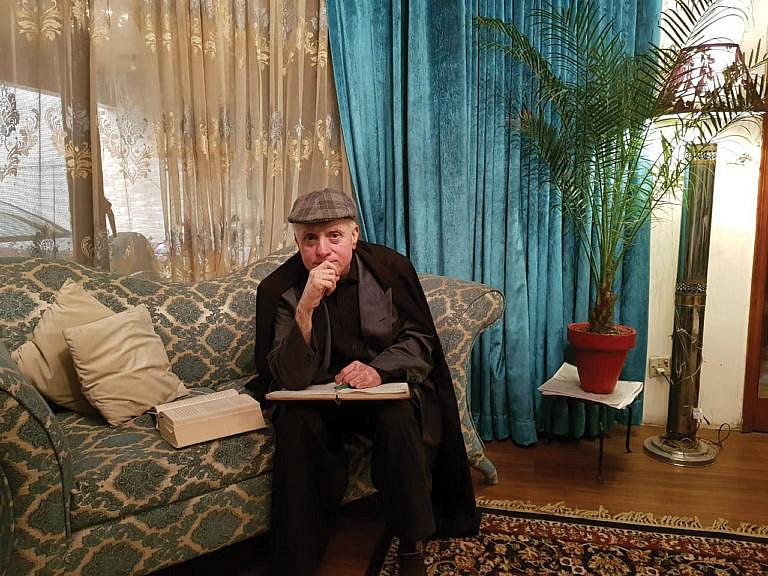Dear Abu: ‘You’ve never been able to read my work, but I know you are proud of me’
Before You Go: Journalist Haroon Khalid writes a letter to his father, who doesn’t speak English, on the heartbreak of their language divide and what brings them together regardless of it

Haroon’s father, Manzoor (Photograph by Nida Khalid)
Share
I remember waiting for you to come home from the factory and join us for lunch. I was around five years old, and every day, I looked forward to sharing what I had learned in class with you over aloo gosht and keema karale.
“What is a valley?” I asked one day. I had heard the English word in school, an English-medium private school in Lahore, Pakistan, earlier that day.
You smiled in a way I had never seen—an uncomfortable grin that I later understood was a look of embarrassment because you didn’t know the answer to my question. Instead, you sifted through your phone diary and started making frantic calls.
I ended up on the phone with an aunt who had a master’s in English and was a teacher at an English-medium school. She began explaining the meaning of the word to me, but I didn’t want to know anymore.
READ: To my teacher and friend: Despite everything, your guidance never wavered
I felt disillusioned. You were the smartest person I knew. You had told me stories of Mughal emperors: their civil wars, their grandiosity and their oppression. But that conversation over lunch was the first time I realized that the English spoken in my classrooms and written in my textbooks was different than the Urdu we spoke at home, and though I could go back and forth between these spaces and languages, you could not.
As I grew older, and as my interests widened, our conversations and your stories disappeared.
I wonder how different our relationship would have been if you understood English, or if I had been educated in Urdu. Would I have continued sharing what I learned in school with you? You often said you wished you knew English so you too could participate in that “global world,” as you referred to it. But you were glad I could speak the language and I could learn things you couldn’t.
In my mid-twenties, I was learning about post-colonialism and orientalism at Lahore University of Management Sciences, and we rediscovered our relationship over our passionate conversations about history, politics and folk culture. We bonded over books I read in English and you in Urdu, like Jawaharlal Nehru’s Glimpses of World History and M.K. Gandhi’s My Experiments with Truth.
READ: ‘You became part of my newfound identity’: A tenant thanks her landlords-turned-friends
Together, we developed a small library in our home. We divided the shelves into two sections, one for your collection of Urdu books, and one for mine in English. I would have loved to browse through the books you read when you were my age, to experience a part of your life through the texts that shaped you, but I couldn’t.
My Urdu reading skills are basic. My education, which was entirely conducted in English, ensured that. My elementary school even had a fine for students discovered speaking any other language on campus.
When I immigrated to Toronto last year, you were happy knowing I would have a more secure future here. We talk over the phone every day. We discuss the situation in Pakistan and different political parties, sometimes delving into Mughal history or the development of Sikhism—topics that I researched for my books. On every other call, you ask about my writing, if I am working on a new article or the status of my latest manuscript.
You’ve never been able to read my work, but you ask me to send signed copies of my books for your acquaintances and you share all my pieces with your friends who can read English over WhatsApp. When you tell me how much your friends “loved” my work, I hear pride but also a sense of sadness in your tone. I know you wish you could read all that I write for yourself.
Though you cannot read my words, I want you to know that my love for writing, reading, history and politics exists because of you.
When I presented you with the first printed copy of my first book, you stared at the cover and passed your hand over my name. After a brief pause you said, “Thank you.” A few days later I saw the book in our library. It was in your section, the only English book in the middle of your Urdu collection. It still rests there, bridging the divide between Urdu and English, you and me—a reminder not of our differences, but of the love we share.
Haroon Khalid’s latest book is Imagining Lahore: The City That Is, the City That Was, published by India Viking.
This article appears in print in the February 2021 issue of Maclean’s magazine with the headline, “Dear Abu…” Subscribe to the monthly print magazine here.
The piece is part of Maclean’s Before You Go series, which collects unique, heartfelt letters from Canadians taking the time to say “Thanks, I love you” to special people in their lives—because we shouldn’t have to wait until it’s too late to tell our loved ones how we really feel. Read more essays here. If you would like to see your own letters or reflections published, send us an email here. For more details about submitting your own, click here.